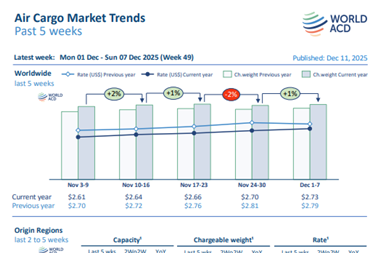Airline association IATA has predicted that the cargo sector will return to growth next year, while airlines are also expected to improve their profitability.
In its annual outlook, IATA said that freight volumes are expected to increase by 2% year on year in 2020 to reach 62.4m tonnes following on from a 3.3% decline to 61.2m tonnes this year.
The demand decline experienced this year is the steepest drop since 2009 during the global financial crisis.
While the return to growth will be welcomed by the sector, IATA warned that cargo yields will continue to slide with a 3% decline forecast for 2020, an improvement from a 5% decline in 2019.
As a result, cargo revenues will slip for a third year in a row in 2020 with revenues expected to total $101.2bn, down 1.1% from 2019.
The improved cargo volume outlook comes as world trade growth is expected to rebound to 3.3% from 0.9% in 2019, as election year pressures in the US contribute to reduced trade tensions. Growth is supported by actions from central banks as well as easing fiscal policy.
And GDP is forecast to expand by 2.7% in 2020, marginally above the 2.5% growth in 2019.
Overall, IATA forecast that the global airline industry will produce a net profit of $29.3bn in 2020, which is an improvement over a net profit of $25.9bn expected in 2019.
If achieved, 2020 will mark the industry’s 11th consecutive year in the black.
Looking back on this year, Alexandre de Juniac, IATA’s director general and chief executive, said: "Slowing economic growth, trade wars, geopolitical tensions and social unrest, plus continuing uncertainty over Brexit all came together to create a tougher than anticipated business environment for airlines.
"Yet the industry managed to achieve a decade in the black, as restructuring and cost-cutting continued to pay dividends. It appears that 2019 will be the bottom of the current economic cycle and the forecast for 2020 is somewhat brighter.
"The big question for 2020 is how capacity will develop, particularly when, as expected, the grounded 737 MAX aircraft return to service and delayed deliveries arrive."
Looking at costs, slower-than-expected global economic growth in 2019 contributed to lower energy demand, with crude oil prices averaging around $65 per barrel (Brent), compared to $71.60 in 2018.
Oil supply is also plentiful, boosting inventories. As a result, oil prices are expected to dip further in 2020 to $63 (Brent), IATA said. Jet kerosene prices are also expected to dip, averaging $75.60 per barrel versus $77 per barrel in 2019.















